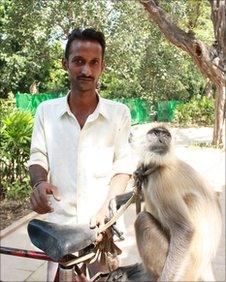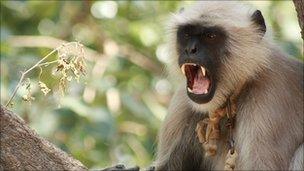Meet India's latest Games recruit - Chhotu the monkey
- Published
Athletes and tourists at the Delhi Commonwealth Games will be protected by the Indian army, police - and monkeys.
The black-faced langurs are deployed at sporting venues to chase away smaller stray monkeys who have menaced the city for years. Gayathri Sreedharan went on patrol with Chhotu (Little One), the latest addition to stadium security.
Monkey trainer Raja Goswami treats his animal "like he's his child"
The "gorilla warfare monkeys" - as some in the press have dubbed them - are the newest members of the Commonwealth protection team, deployed near sporting venues across Delhi.
Chhotu is one of 10 langurs - originally from the state of Rajasthan - specially drafted in by the Delhi Municipal Corporation for the Games.
City authorities have used the black-faced simians to combat smaller monkeys regularly - and with good reason. In 2006 a senior Delhi government official fell from his first floor residence after being attacked by a gang of monkeys - he died from his injuries.
It seems langurs are the only primates here that can take on the rhesus macaques without fear.
Monkey business
Chhotu works a long shift - from nine to six and sometimes longer - as part of his contract.
His job is to stand guard by Gate Number Three at Talkatora stadium, where the boxing and swimming venues are.

Bikes are the best way to travel...
Scowl firmly in place from birth, he strolls up and down along the pavement on Mother Teresa Crescent Road, albeit on a leash, making his presence felt.
This serves as a warning to other monkeys.
But watching and waiting in the sun is no easy task, and snacks and water breaks are hard to come by. For this, his handler is paid 6,400 rupees ($130) per month.
Chhotu was brought to Delhi when he was one, and has had three of years of intensive training. Langurs are often treated as pets in north Indian villages, but for Chhotu a life of recreation has been surrendered to a life of work.
Training therefore, is essential.
He has learnt not to run away, to listen for and obey certain commands like sit, eat, hold, run and catch.
Significantly, he has learnt not run too far up into a tree when on a leash - trained langurs often run the risk of accidentally hanging themselves by the chains or ropes around their necks.
A langur can cost up to 10,000 rupees ($200), especially those like Chhotu and his three-year-old companion, Raja, another monkey-catcher-in training.
That is double the amount charged for a Labrador in India.
''Chhotu is very friendly, really quite harmless, but can be pricey in other ways too,'' his handler Raja Goswami reveals, as his pet primate perches above him on a branch, peering lazily at his surroundings.

... but don't mess with me - langurs can take on dozens of smaller monkeys
He lets out a yawn, baring a set of sharp white teeth known to tear through and kill smaller animals in seconds.
''He can be moody, and when angry or irritated he can be difficult to control; but at such times we have to make him a peace offering, something nice to eat, a titbit or sweetmeat. With a snack in hand, he'll climb down in no time,'' Mr Goswami says.
His favourites? Chick peas and fruit.
"They aren't just a livelihood - they're our friends, no, children! We treat them like our children," Mr Goswami says.
"Our days begin and end with them. We wake up, bathe them, feed them, sit them down on the back seat and cycle to work with them. My entire day is spent with my langurs; what else would you expect?''
Langurs are nothing new to Delhi residents who say the rhesus macaques are a big problem.
One passer-by on his way to work stopped to admire Chhotu.
"We need these creatures more than anything in Delhi," Rajender Singh says. "Bandars [monkeys] are such a problem here, it's difficult to step out with children because we're afraid of what they might do.
"I've seen them [langurs] working on the presidential estate - I really respect them for taking on those trouble-makers."
- Published29 September 2010